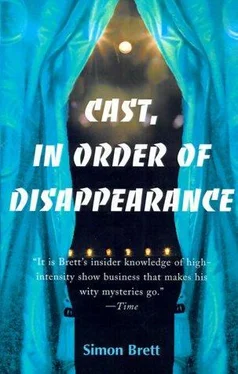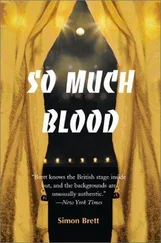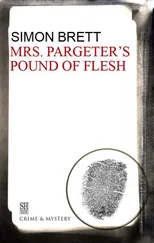Simon Brett - Cast in Order of Disappearance
Здесь есть возможность читать онлайн «Simon Brett - Cast in Order of Disappearance» весь текст электронной книги совершенно бесплатно (целиком полную версию без сокращений). В некоторых случаях можно слушать аудио, скачать через торрент в формате fb2 и присутствует краткое содержание. Жанр: Классический детектив, на английском языке. Описание произведения, (предисловие) а так же отзывы посетителей доступны на портале библиотеки ЛибКат.
- Название:Cast in Order of Disappearance
- Автор:
- Жанр:
- Год:неизвестен
- ISBN:нет данных
- Рейтинг книги:3 / 5. Голосов: 1
-
Избранное:Добавить в избранное
- Отзывы:
-
Ваша оценка:
- 60
- 1
- 2
- 3
- 4
- 5
Cast in Order of Disappearance: краткое содержание, описание и аннотация
Предлагаем к чтению аннотацию, описание, краткое содержание или предисловие (зависит от того, что написал сам автор книги «Cast in Order of Disappearance»). Если вы не нашли необходимую информацию о книге — напишите в комментариях, мы постараемся отыскать её.
Cast in Order of Disappearance — читать онлайн бесплатно полную книгу (весь текст) целиком
Ниже представлен текст книги, разбитый по страницам. Система сохранения места последней прочитанной страницы, позволяет с удобством читать онлайн бесплатно книгу «Cast in Order of Disappearance», без необходимости каждый раз заново искать на чём Вы остановились. Поставьте закладку, и сможете в любой момент перейти на страницу, на которой закончили чтение.
Интервал:
Закладка:
XIV
The zombie walks was one of the worst film scripts ever conceived. The Zombie (played by a well-known Horror Film Specialist) had walked for a thousand years in a subterranean cavern which was broken open by an earthquake in Lisbon. By means not specified, from Portugal he arrived in Victorian England, where he got the idea that Lady Laetitia Winthrop (played by a ‘discovery’ from the world of modelling, whose acting talent was 36-23-36) was his long-lost love from a world before the subterranean cavern. He therefore determined to seize her from Winthrop Grange where she lived with her father Lord Archibald Winthrop (played by a well-known character actor who did commercials for tea-bags). After the Zombie’s travels through Victorian London (where, incidentally, he committed the crimes attributed to Jack the Ripper) he arrived at the Grange and enlisted the help of Tick, a deformed coachman of evil character (played by Charles Paris). As the Zombie progressed, he committed murder after murder, and his victims, rather than dying and lying down, became zombies too, until at the end Winthrop Grange was besieged by a whole army of the walking dead. Had it not been for the activities of Lady Laetitia’s lover, bold Sir Rupert Cartland (played by an odious young actor who’d risen to prominence by playing a tough naval lieutenant in a television series) making with the garlic and the wooden stakes (a bit of vampire lore crept into the script), Lady Laetitia and her father would have been turned into zombies and carried back to the subterranean cave, where they would never be heard of again. Which, to Charles’ mind, wouldn’t have been a bad thing.
They were filming at Bloomwater, a stately home in Berkshire which had been built by Sir Henry Manceville, an eccentric nobleman, in 1780. Manceville had designed it himself as a great Gothic palace and even incorporated the specially-built ruins of an abbey into one wing. It was a monumental folly, which could have been made for horror films. In fact, had the cinema been invented at the time, it probably would have been. Sir Henry Manceville had been obsessed with ghosts and, in later life, when his eccentricity slid into madness, he used to terrify his servants by walking the Long Gallery, dressed in a sheet, dragging a length of chain and wailing piteously.
Bloomwater’s present owner was a more prosaic figure, Sir Lionel Newman, the paper magnate. He was a man who, like Marius Steen, had risen from humble origins to immense wealth and had surrounded himself with all the symbols of the established aristocracy. His association with Marius Steen had been the reason why Bloomwater was being used for the filming.
Charles found that, as ever, making a film involved much more hanging around than actual work. The director, a little Cockney who glorified in the name of Jean-Luc Roussel, generated an impression of enormous activity as he buzzed around checking camera angles, getting the lighting changed, demonstrating the special effects and bawling out the continuity girl. But very little actually seemed to get done.
Charles didn’t find many sympathetic characters among the cast. The Horror Film Specialist was surrounded by an admiring coterie of lesser horror film specialists and most of their conversation referred back to previous triumphs. (‘Do you remember that Dracula when your fang got stuck in the girl’s bra?’; or ‘I’ll never forget that girl who had hysterics during that human sacrifice’; or ‘Do you remember that take as the Werewolf when you forgot your line and said “Bow-Wow”?’) They all sat around, reminding each other of things they all remembered, each waiting his cue for the next reminiscence to be slotted in.
So Charles went off on his own most of the time. He sat in the Library (later to be the scene of the appallingly-written quarrel between Lord Archibald and Sir Rupert) and did the crossword or played patience.
On the Wednesday morning of the first week of the schedule he was sitting with the cards spread before him and feeling fairly secure. The film world still has an outdated generosity in its dealings with actors. The big-spending Hollywood myth retains its influence and the Zombie cast were well looked after by Steenway Productions, with cars organised to get them to and from the set. The early starts were a disadvantage, but Charles had minimised that by staying with Miles and Juliet and having the car pick him up at six. Then he could sleep through the drive and the laborious business of make-up. Quite cosy. And the money was good.
He also felt as secure as he could about Jacqui. The shock of the trip-wire incident had worn off and she was fairly well hidden. He’d wanted to send her off to some relative in the country, but she didn’t seem to have any family. In fact, when they went into it, it was amazing how few people Jacqui had to call on. No family, or at least none she kept in touch with, no girl-friends. The centre of her life had always been men, either one at a time or many. A lot of girls end up promiscuous, when all they’re looking for is friendship. Jacqui’s lack of other resources explained both her desolation when Steen seemed to have dropped her and her reliance on Charles. (Even her leaping into bed with him again. She needed to keep up her continuity of male companionship, and humbly thought she had nothing to offer but sex.)
Charles had considered parking her on Frances in Muswell Hill, but the incongruity of the thought of the two women together was too great. So in the end he had given her his keys to the room in Hereford Road. He felt fairly confident that Nigel Steen, or whoever was mounting the campaign against her, did not know of any tie-up with Charles Paris. Hereford Road was dangerously near Orme Gardens, but it was only a short-term solution while the film lasted. Jacqui was likely to stay in most of the time with her portable television; her pregnancy made her quite content to do so. Obviously she’d have to go out to the shops from time to time, but she’d had her hair dyed black on the Saturday, bought a new winter coat and a large pair of dark glasses. That should keep her safe. Charles could imagine Jacqui quite happy in her enforced confinement. Hers was not a demanding character, and so long as she felt some evidence of a man’s care (which living in Charles’ room would give her) she would not need more. When the Zombie had finished his walk, a more permanent method of protecting her for the next four months would have to be found.
They’d considered going to the police, but agreed that, after the embarrassing debacle of the inquest, further accusations from Jacqui against Nigel Steen would sound more like the ramblings of a paranoid than anything else. It was safer for her simply to go underground. Charles rang daily to check everything was all right.
So he felt secure as he sat looking over the rolling lawns of Bloomwater. To add to his pleasure, the patience came out. He was just laying the cards down for another game, when he heard the door open behind him. He turned and the girl who had just come in let out a little scream.
For a moment he couldn’t think what was worrying her, until he remembered his make-up. His own hair was hidden under a latex cap from which a few grey wisps straggled crazily. His eyes were red-rimmed and sagging, his nose a mass of pustules, and his teeth had been blacked out with enamel. The whole face had the unearthly green tinge of dead flesh, which Jean-Luc Roussel was convinced was the mark of a zombie.
‘I’m sorry,’ said Charles. ‘I’m afraid I do look rather a fright.’
‘Oh, that’s all right. I just wasn’t expecting it.’ The girl looked about sixteen and recently aware of her considerable attractions. Her black hair was swept back in the careless style that only the most expensive hairdressing can give. She was wearing check trousers and a red polo-necked sweater that accentuated the perfect roundness of her bra-less small breasts. For the first time in over a month Charles felt certain that he hadn’t lost interest in sex.
Читать дальшеИнтервал:
Закладка:
Похожие книги на «Cast in Order of Disappearance»
Представляем Вашему вниманию похожие книги на «Cast in Order of Disappearance» списком для выбора. Мы отобрали схожую по названию и смыслу литературу в надежде предоставить читателям больше вариантов отыскать новые, интересные, ещё непрочитанные произведения.
Обсуждение, отзывы о книге «Cast in Order of Disappearance» и просто собственные мнения читателей. Оставьте ваши комментарии, напишите, что Вы думаете о произведении, его смысле или главных героях. Укажите что конкретно понравилось, а что нет, и почему Вы так считаете.












